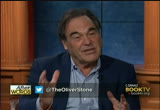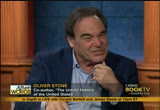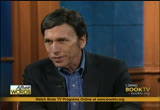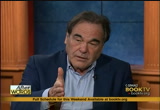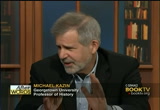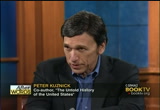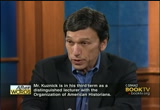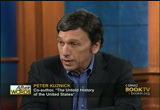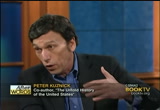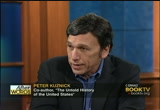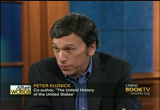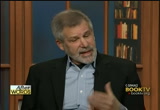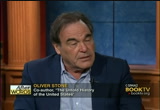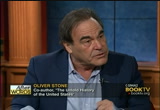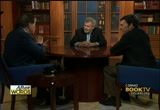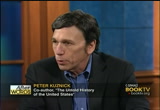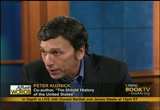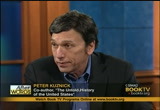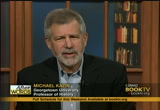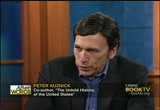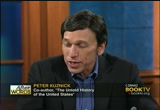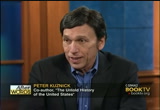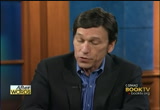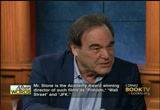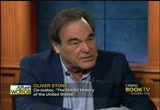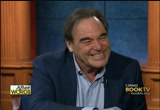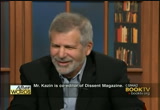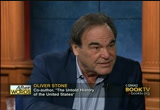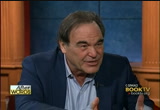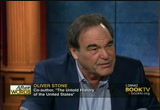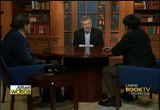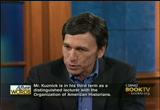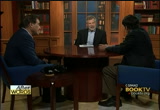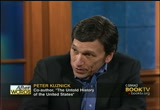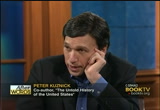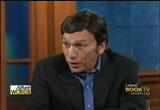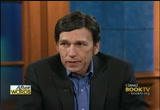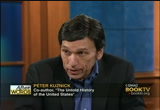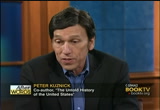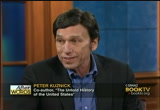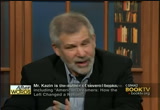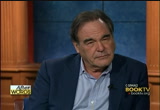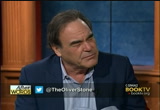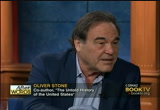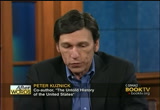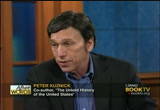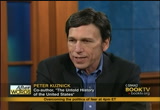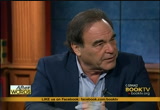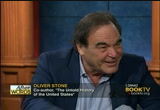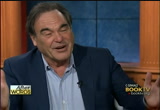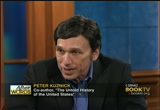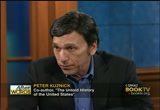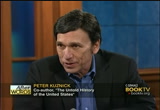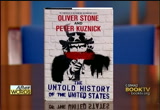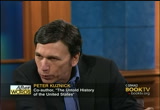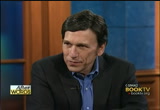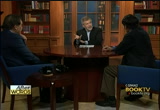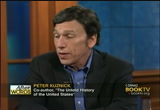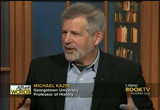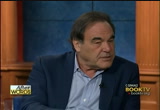tv Book TV After Words CSPAN January 6, 2013 11:00am-12:00pm EST
11:00 am
up. everything we did was in the shadow of that. so i was curious. well, the bomb store really does have another origin. 1930's. he had written a book about the scientists, but above all he mentioned this figure, henry wallace and how he could have been president in 1944, but he was bumped by the political bosses. that led, of course, to the decision by chairman. that became the origin for a documentary or movie. he wrote a script. ..
11:01 am
>> the book, we decided this is getting very serious. we know i'm going to be called on this because of my background in making movies. this was part fiction, part fantasy, but we decided to go ahead and go with this book. peter took over the book. i was running the film, and we were crossbreeding all the time and checking each other constantly. but i took about four and a half, five years now. that's where we are today thank you that was pretty thorough. we have been friends for the altered since 1996. then we decide record to go ahead with this project. i've had a sabbatical, thought it was going to be a "60
11:02 am
minutes" documentary. now a 10 adversaries. what i thought was going to take one semester ended up taking four years, four and a half years so it's been a big project. it's important for us to have the book because i was surprised how little information you can convey in a "60 minutes" documentary. in each episode. the book, an 800 page book, we cut out 200 pages to get down to 800 page it because there's so much we wanted to do. we also wanted to give the footnote, the sources and much more detailed discussion of his mentor. we know we will be challenged. we're offering a perspective that is not the mainstream perspective and we wanted to have our sources out there when we do get challenged. >> host: people like my daughter and my sons who have been in the high school level history. they wanted to here's a you could read this book and see this documentary and stuff but you could understand.
11:03 am
college-level come you start to specialize, much of this is available to students. and they do we really want -- my daughter's history books even today, when you get, for example, do he was shima, there's no mention of an alternative possibility. it's the american had to drop the bomb to save american bows because the japanese were fanatics. you don't hear about the russian side of an you don't hear about the other choices that could be had. >> this book stirred up a controversy and expected it to. i wonder if we get into some of the areas coming in, historians like to argue about and that have already elicited commentary on different sites. the cold war, is what you're writing about here, and to the film. and perhaps as i alluded you argue so much is the trend is
11:04 am
primarily to blame for the beginning of the cold war, that stalin and the soviets would've been, would've been opened and were welcoming the wartime alliance between the two countries. but it was american action primarily with some allies, british, for example. is that an accurate -- >> i would say that is accurate. we certainly don't consider stalin is blameless in all of us. we certainly don't downplay stalin's brutality or the terrible things that were done in the name of the soviet union under stalin's leadership. that's important a factor in. if we look at the broad sweep of the history, beginning in 1917, 1918 when the tray first sent troops into the soviet union as
11:05 am
part of a broader counterrevolutionary force led by the british, then the united states seem to recognize the soviets in 1933 under roosevelt. then during the '30s, the soviet union was pushing very hard for international consensus in trying to stop hitler. the anti-fascist forces globally and the commons party was -- as a result of that. but then during the war, after germany attacked the soviet union in 1941, then the united states and the british decide they will support the soviet union because, to bring the service can keep the soviets in the war. the soviets were caught so offguard that the british were concerned that the service would think -- capitulates at the moment. the united states offer several things. the soviets make several demands. the united states promises matériel and has a hard time living there for a number of reasons. in the first couple of years.
11:06 am
stalin said if you give us the airplanes and other equipment that we need, the united states tries to roosevelt makes an effort. other people are not as quite sincere in providing. the soviets second and, they wanted some the same territorial concessions they've gotten from hitler in the 1939 pacom and their main demand was for the second front. they were fighting, this is the history of this breed, the americans and the british throughout most of the war were fighting 10 nazi divisions along to the soviets alone providing at least 200 through 44. and so they were desperate for the united states to open up a second front in western europe and the british. and roosevelt asked stalin to send molotov and a top general to washington in may of 42, and in june of 42, the nazis issued a public statement we're going to open up the second front before the end of the war,
11:07 am
before the end of the year in 1942. we promised that publicly. and yet and we don't open up the second front until june of 44. that's partly because the british refused to go along with it. the united states and the british get involved in what marshall called -- and northern africa. marshall and eisenhower were serious at the united states didn't open up the second front and that the united states went instead basically defend the british empire. >> there would be a lot of missed trust between the united states and the soviets beginning during the war. there were seeds of the cold war actually visible during the war. in june of 44, there's certain tensions of course because the fact we delayed the second front is that the soviets had on their own largely defeated the germans after stalingrad and were pushing across central europe and eastern europe moving toward berlin during that time. so the united states comes in.
11:08 am
we lost the military initiative by the point i was lost a diplomatic initiative at that point. so there's certain deals being made. deals between churchill and stalin in october of 44. the british would get 90%, the russians would get 90%, and oak area and hungry, lined up that way. it was pretty cynical. but when roosevelt dies in april of 40, his last telegram to church was would always have these minor disagreement with the russians but we get them result. let's not make a big do. there's no reason what we can maintain censures after the war. when truman gets in on april 12, 1945, he immediately takes a different course. roosevelt's alliance with the soviets was still very strong at that point. trueman turns to his advisers to roosevelt never trusted in the first place, the second of
11:09 am
april, -- [inaudible] they give tremendous a message to the soviets are breaking all other agreements. they can't be trusted. they have broken all the yalta agreement. and so what we're going to see is in two weeks the u.s. policy toward the soviet union is going to change in april of 1945. by the time that big meeting of april 23 with molotov and apri april 23, the united states had changed course. and so at that meeting, truman -- first he meets with his visors. they are divided. they send marshall, leahy are all telling him don't break with the soviets. he understood and he said the soviets have a much better understanding of their own security, especially around poland and we do. >> if i could just interrupt. back to the details, do you
11:10 am
think it was realistic for these two powerful nation, continental powers, each of whom had i think it's fair to say an empire, one in formal, one of the more informal or if the soviets had all these different states in the control and going to keep control of the baltic states and, of course, moving into eastern europe, was it realistic for these two powers with very different bases to really get along quite or were they really destined to have a cold war, and likely, never really a hot war? so these details are important but who knows of course where it would happen. but arguably, and stalin as you know himself, one of the heads of the french communist party told the american communist in april of 45, get ready for the
11:11 am
wars. in effect, don't believe that the distance will last but at the same time as roosevelt was dying. if you want to comment? >> well, you're asking census of the questions about the french communist. do want to do with the first? i would just like to add -- [talking over each other] spent as a person who came to look at world war ii in a different aspect than it ever did as a young person, when it was victory at sea, what -- i would not downplay the british empire. that's the biggest empire of a all. we are a coming power. so was russia. because they grow during the war, the soviet union. don't forget, they armed themselves across the euro amounts. they remake themselves. it's an extraordinary story. reconstruction and dedication of the people.
11:12 am
the idea is the whole nation climbs into this thing. it was a crucible, great war. but the british -- churchill as a fastening overlay because once the british islands are saved in the battle of britain, his goal seems to be true to regain the entire. he said i do not come upon this thing to dismember the british empire. the whole concept of going to north africa, sending troops up the southern valley of the nazi empire, reaching greece, which is a tremendous story. everyone talks were eastern europe. as an outsider i think about what about the british when they went back in 1944 and started divebombing the streets of athens? the people, time in his resistance who fought valiantly against the nazis. the british were relentless. people say look what stalin did in poland, he broke the yalta.
11:13 am
i don't believe he broke yalta. look what the british did. no one ever points to that. then what we did increase in the cold war period, the early cold war period in the truman doctrine, 47-49. we had a american advisers early vietnam were already over increase. that's jumping ahead of the british goal is truly -- but back to metaframe, go on to the oil regions. beyond that, it is crucial to churchill. then beyond that he gets singapore back. he gets the far east. it is the richest resource in the world. not us. so that becomes -- it's not a subplot. it is a key plot. >> three parts cold war ended
11:14 am
beginning. most americans have no idea and they have no idea what role the british were playing. but relative -- roosevelt did and roosevelt was very, very critical of the british empire as was the vice president from 41-45, henry wallace. he wanted to dismantle the british empire, dismantle the french embark, the portuguese, the dutch. they were very anti-global. truman as we know, encourage them and give them aid in support. [talking over each other] >> and gets us involved in vietnam. a lot of the turmoil we will later face. the other question you are raising is a fair and important one. we don't know if, if it would've been a clash between the americans and the soviets. we have different interests but we had a very good wartime allies. and that april 23 crucial meeting, marshall and simpson both make the point that not only have the soviets been good
11:15 am
wartime allies, they've offered delivered more than they promised. so they were both confident the could be postwar friendship to eisenhower wisher at the point that there would be poised agai- postwar friendship. roosevelt had feelings along those lines. that's why i'm still focusing on, this was just two weeks, how rapidly things change. two weeks when trimming takes over. wind turbine comes in it is going over his head which he had this recurring nightmare, the vice president, there would be a knock on his door in the middle of the night, the secret service would come and say the president is dead, that you were president now. that was his 90. it was his nightmare for good reason. he was not prepared. he was not chosen because he was qualified to run. when he was chosen in 1934 to run for the senate, and her breast was asked why did you choose harry truman of all people to run for the senate?
11:16 am
and pendergast said i wanted to show the world that a well oiled machine can take an office boy and get him elected to the senate. truman in his first term was considered the senator from pendergrast. he was shunned by the other centers. he devotes more of a national reputation buddies not expert on any of these kinds of issues. he gets in there and write from the beginning every meeting he had with people he says, this is a terrible mistake. i'm not big enough. i'm not smart enough. the meeting goes on, his first day in office and he meets with a reporter at the capital. he says boys, if you pray, pray for been a. i don't know if any of you ever had -- i feel that the moon, the stars and all the planets are falling on me. one of them said good luck, mr. president. and truman said i wish you didn't have to call me that. >> [inaudible] >> perhaps the strongest day but an unsung hero.
11:17 am
working on the screenplay of while back about wallace. this is one of the great -- its factual of course of modern american history, what if he had gotten we nominate back in 1944. you are to invoke book i know he came close to it. the florida from -- the senator from florida was about to nominate him. the convention would have gone over there. he was much more popular certainly than the other people. however, i do want to press you all on that because it i think probably the best article of wallace, american dreamer, a former senator from iowa, they make it pretty clear at least based on the evidence that fdr didn't want wallace to run within. that he did, i think in a meeting they had in july 1944, but that very evening he meets
11:18 am
with people who were very against wallace, the machine, who didn't like wallace from people from missouri and others. according to them, wallace's name doesn't even. , up. if wallace had gotten the nomination, he might be running with a man, a dying man who didn't want him on his ticket. >> i got a very different reading having been through every piece of information for a long time. [talking over each other] >> that's a valid perspective on this. roosevelt in 1944 was getting very ill. the party bosses knew that he was feeble, that there was almost no chance he was going to survive another term. they decided they were going to
11:19 am
try to get wallace off the ticket. it was run by two people, bob hannigan, the national chairman who ran the st. louis machine, and ed pauly. and toyed with the california oil millionaire who said i went into politics and i realized it was cheaper to elect a new conference than to buy and own. he would later get indicted, and for good reason. >> his name was on -- >> exactly. so they decided that they would try to surround roosevelt with all the people who are hostile to wallace to convince them that he can get reelected if wallace is on the ticket. in 194 1941 when head relos mads famous speech, 20 center will be the american century and united states will dominate the world economically and politically and militarily and culturally, wallace responded as vice president he made his famous
11:20 am
speech said, the 20 center should not be the american century, it should be the center of the common man. what we need is a worldwide people of resolution in the tradition of the french, american, latin american, the russian revolution. he called for ending colonialism, in the realism and economic exploitation, spreading its roots in science and technology around the world. and he had enemies here. his enemies with the southern segregation. the anti-imperialists, and the conservatives who said american fascists are those people who think wall street -- so he had enemies and those enemies want to get rid of him on the ticket in 1944. the big problem was he was enormously popular. on july 20, 1944, the night the convention starts in chicago, potential voters who they want to run on vice president dick
11:21 am
65% said they wanted wallace on the ticket or 2% said they wanted harry truman. the question was how was the party bosses going to support. roosevelt was very feeble. when party bosses are to come to them and they want to get wallace off the ticket, roosevelt says to him, i support wallace but i can't fight this campaign myself. i'm not strong enough again. i am depending on you guys to do it. finally, caved in. his family was furious. eleanor roosevelt was furious with them. every one of the rows of kids was furious with them. they were huge wallace supporters. he had all the black delegates at the convention, all the progress. there were fights in the party that is split still today in the democratic party. roosevelt didn't have the gumption to fight at that point. he lost that strength. wallace said publicly at the convention if i were a delegate
11:22 am
i would vote for henry wallace, which he would have, but it's tragic as a say in the document is, it's tragic you didn't have the strength to fight at that point for wallace. >> i sense in the opening question, michael, you're pointing to the forces of history. and i see the marxist side of this, the forces that pushed history -- [inaudible] >> in the sense of wallace would've been opposed and the forces were not in his favor and the forces were ultimately between this capitalism versus communists ideology would clash and that would begin. that, of course, was the subject of the february 46 speech stalled amid that was misinterpreted by the west by the two systems are that speech -- when you read the speech --
11:23 am
[inaudible] >> that goes back to churchill. step up in the cold war. we go into those months by month, july 45 right to march 46 when churchill gives this incredible speech. again, i'm coming from the outside. you studied this on your life. i'm fascinated by the '30s. we did a chapter on the '30s and also the philippines, the woodrow wilson period. >> and what happens is the concept of communism comes in as many phases in america, but certainly in labor. that ties to the ideas, some of the ideals of socialism, and we see it in all the union members of the 1870s. we see it in a relationship to the french collectives of the 1870s and 1830s. there's working man's right, the progressive movement. it works through american issue.
11:24 am
wilson puts a stop on it. he comes down, eugene debs ghosted jail. all these people disappear. they are thrown out of the country because they resist world war i. so these are the forces that are moving america, this wilson movement towards this place we're going to. i'm curious to know what you think those forces are. where the labor movement is going to end up. i think peter and i would argue there are moments in history, and the point where things can truly change, whether can be a wallace that make the convention moment. weather can be -- [inaudible] >> which could turn and could turn again, and maybe have turned in the past. >> wallace came so close. >> i'm just thinking what he's thinking about. >> i'm just an interviewer. >> well, you know, i think there's a big difference in someone like emma goldman and
11:25 am
communists, especially communists who have power. in the goldman goes to russia and 1920, 21. she goes there with great hopes. her fellow anarchists are being rounded up and killed. she argues this is, i think quite rightly, a radical system. industrialize the country with tremendous, tremendous -- [inaudible]. so i can add it as it's a common is lessened if someone thinks that stalin was horrible mass murder, one of the worst in history, and yet at the same time i agree with both of you that the united states is hardly brainless and -- blameless. so we have to take a brief and a few seconds but when we returned i would like to move forward to
11:26 am
kennedy and talk about the clerk dramatic turning point of the cuban missile crisis. >> would you say that the american capitalists were very concerned about the labor movement? >> yes. >> and during the '30s. >> still are. >> exactly, that's my point. in the 1930s, a very threatening moment and during the strikes of world war ii. for more strikes from world war ii. there were more strikes during world war ii than any other timeline. tremendous dissatisfaction right after the war, 45, 46. there's dislocations and american life. the bosses, the owners, the elites to look, the tensions that exist in american life by pointing to stalin and the
11:27 am
communists and saying this is the any? >> of course. this was a scare against the commonest party which was declining quickly. the progressive party. of course the cold war. at the same time we can say american right and american corporate views, to turn people against labor, against -- at the same time without denial that -- [talking over each other] spend what we were doing in eastern europe was take what independence, take away democracy, killing dissidents. >> we are not finding -- were is the energy? the energy is in the united states. stop these strikes. stop the labor. i think stalin has always been a convenient distraction for the
11:28 am
right and the center. up to today, to get away -- >> the fact they could agreed also made easier, the right to do that. >> that's what concerns me. when you feel all the liberals, so to speak, and also the truman liberals, the hard clippers that were in this direction. and it changes american history terribly because right now we have no union movement. i think the concept of labor, it's not even discussed in this country. [talking over each other] >> this is what's happened. this is far more important, friendly, then pointing the finger at the soviet union. why not point it at, as i said earlier, churchill increase in athens in 1944? [talking over each other] >> we've got to take a break. we will jump forward after the
11:29 am
break. >> sorry, i just wanted -- spent on the go? "after words" is available via podcast. visit booktv.org and click podcast on the upper left side of the page. select which podcast you would like to download and listen to pete"after words" while you tra. >> okay. i'd like to jump forward to the '60s. and talk about john f. kennedy, still perhaps the most lovable president in american history. alleys of people alive now. -- at least of people alive now. clearly, one of the most dramatic and scariest events of his presidency was the cuban missile crisis in october 1962, which all of us lived through as teenagers.
11:30 am
11:31 am
often running, operation mongoose, which was our counterinsurgency program, basically a terrorist program against the castro government. clear the u.s. planning an invasion. khrushchev that he could kill two birds with one stone by changing the balance, the united states was so far ahead in missiles and in ability to deliver warheads that he thought if we could put the intermediate range ballistic missiles into cuba that would somewhat offset america's big advantage in nuclear weaponry in 1962, and it could deter a u.s. invasion of cuba. mistake was not announcing the weapons were there and announcing he had 100 battlefield of their weapons there which the united states did not find out until 1992 and mcnamara turned white and almost passed out. so -- >> host: that advisor to president. >> guest: and so they put the missiles in cuba, the unisys discovers that with our surveillance flights.
11:32 am
and then the tension builds. we have a quarantine, blockade around cuba. in one of the things that happens is that a soviet submarine is found by american ships, and they start to the drop depth charges on the soviet submarine. then knocked out the electrical system, carbon dioxide was rising, people passing out. they had no communications with the kremlin. the commander of the submarine says, of the torpedoes, let's attack. the world war probably started already above. mike going to do somersaults down here. not going to discuss our country they said it ready to launch. one of the other commanders talk to not of it. his name was occupy. nighter save the world. the sino-soviet commander.
11:33 am
he talked him out of launching a nuclear torpedo. had he will or three would start right there. even after that we came very close, planning the invasion. it's amazing how little we knew about what we were going to find. we had 33 of the 42 high rpm disk, we did not know where the other ones were, no idea where the nuclear warheads were. our plan was step invade and also to bomb, destroyed the soviet facilities there. we later found out, we assumed that the soviets had 10,000 troops there and that there were 100,000 armed cubans. we later find out that the soviets had 43,000 troops there, and there were 270,000 armed cubans. our initial plan was to take 18,000 casualties, 4500 dead.
11:34 am
when mcnamara found out how many troops there actually work and he said that would have been 25,000 dead. then he found that they had a hundred battlefield nuclear weapons that would likely be using american forces. 100,000 americans would have been killed. absolutely destroyed cuba and very likely taken at the soviet union also. both doing everything they could to try to prevent a nuclear war. they finally succeeded. kennedy said the chances are one of the two that we would have ended their war. khrushchev that there were closer than that. the american invasion had begun. >> host: is great found dr. strange love was in many ways. >> guest: and he had no way to know how close he was to the actual truth of what was happening. >> host: do you agree with the story that this was a key turning point in the cold war? >> yes.
11:35 am
>> host: much more friendly to. >> guest: to the brink. of all the 1950's prelude to this, brinksmanship on the part of dulles and eisenhower using the nuclear threat to black men. so there is a background here, but this is so close to the edge it really was one of the scariest moments in mankind. we did not know this. we were teenagers. now and just so grateful. all this criticism with kennedy and all this -- after quarterbacking, my god. we would not even be here to talk. >> wanted to invade and afterwards when they said that we were defeated therefore secretary. >> that was a mistake. >> the one who ran the bombing against the japanese in world war ii, firebombing.
11:36 am
>> guest: he's pushing him to solve this and not have things get out of control. >> guest: to the extent. maybe good can come from this evil. and khrushchev said, let's eliminate every crisis point that can lead to another conflict between us. his initial response was slow. >> host: he gets overthrown. >> guest: packed down in the cuban missile crisis. and then never forgive her for that dodgers that people never forgive kennedy for backing down . they were furious. we lost. let's go and invade now. but he reaches out. kennedy respond slowly. but first, they realize, they go over there and meets with khrushchev. he's very frustrated. >> host: the editor of what
11:37 am
used to be an important magazine >> guest: he said the same thing. he's in fear. and kennedy response. he responds in a number of places. he already neutralizes, except the neutralist station which made people very angry, but now he says let's and the space race, his signature initiative. why should we compete? let's go to do it together. and we believe he gives a strong indication that he wants to pull out of vietnam. and his american university speech, which i think is the most visionary speech by an american president and a 20th-century, it basically calls -- >> instead of you. and he has a couple others that are wonderful. this is a great speech. june of '63 basically says let's end the cold war. and is reaching out to responding. both of them are reaching into each other. they find the limited test entry
11:38 am
which is a major milestone, major victory. a series of things that taking place during this time. kennedy also learns other lessons as we talk about, and one of them was don't trust the cia and don't trust the joint chiefs. he refers to those joined chief sons of bitches as cia bastards and said, i'm going to destroy the cia, tear it into 1,000 pieces and scatter them in the wind. he has a lot of enemies. >> host: he fires. and he puts the cia operatives under the ambassadors of the various countries, and there were furious about that also. we see kennedy a real change of mind after the cuban missile crisis. we see a new kennedy. a visionary kennedy, kennedy who wants to end the war to. that's the tragedy. as the tragedy. >> why do you call your airport dulles airport? does not meant to be insulting.
11:39 am
>> the reagan airport. the reagan airport. at least we have thurgood marshall and baltimore. >> host: now, obviously one of the last things that happens well he is a lie that has a very important impact on his foreign-policy is the assassination of the president of south vietnam from our client, our allies for there. and then two weeks later kennedy himself was assassinated. as you were saying before, this raised the question that the story cannot pro league we will keep arguing about for the next 50 years, with kennedy have wanted said -- would he have pull that american troops out of vietnam, the advisers of a vietnam if he did not have troops in great numbers are, combat troops. and you argue, think, that indications are that he would
11:40 am
have. you cite various sources about that. just curious, just to challenge that little bit, there's a wonderful book by a historian called choosing war in which she says that the viet cong attacks were doubling in november from the month before, south vietnam, and that there were meetings of kennedy's top but pfizer's in honolulu which finished up just a data for kennedy was assassinated. this could be a great film. and evidently burgling to win if the u.s. did not do something very quickly. so not said challenge the members -- memories of people were involved in this and say he would have pulled out, but wouldn't it have presented kennedy, if he had lived, with a very difficult choice which is
11:41 am
moving to a peasant army in effect, a guerrilla force which was obviously being backed by the soviet union. >> kennedy, i think we make the argument that kennedy had been under pressure from the joint chiefs in an enormous weight, the cuban missile crisis and also the bay of pigs and he had said no. so he was the one who could stand up to them. that meeting in hulloo was mentioned years ago by fletcher party. mr. x. a very strange stang. he says are all meeting in honolulu. most of the cabinet was out of the country when the president was killed in dallas. it seems to have been a -- one could argue that johnson very quickly met on that monday, the date before kennedy was buried, sunday at think. very quickly met with the joint chiefs and clearly indicated that he was going to reverse the kennedy policy. and in january 2 months later he
11:42 am
initiated the new ns a.m. to 73 which essentially allowed for an enormous jump an acceleration. and that plan had a lot to do with the gulf of tonkin. and the approach toward, it's an interesting thing. i had never heard before. johnson tells doris goodwin they're in his life that after he had lost the presidency he said, you know, i gave up the great society because i did not want to lose in vietnam. such was his -- just the concept of being seen as weak haunted johnson. whereas we argue that it did not hunt into the -- kennedy. he had seen the suffering. he had been in combat in the way that he saw defeat. he knew much of his life. his older brother was killed in the war. he had been to vietnam. his brother, robert, very
11:43 am
eloquent when he said -- >> the senator. >> a very important point. because when kennedy was interviewed and 67, a lot of people changed their view after this tet offensive and 68. in 67 before that when most people were still supporting the war kennedy and he says, we would never send combat troops in there. and kennedy system, how come you were so smart, so pressing? and he says that he almost jumped out of his seat when robert answer because he says, because we were there in 51. resole was happening. we knew that they could not win this kind of thing. he says that we would have just as it up. we would have said we were asked to leave, invited to leave for one, it was natural. >> that's what he said. and macarthur's "to kennedy.
11:44 am
>> a cap on. people pushed kennedy. he met with macarthur. mcarthur said you have to have your head examined if you get the u.s. involved in a ground war in asia. kennedy would always -- >> repeated. about afghanistan. >> and he's right. there were both right. kennedy took that lesson, but by the mayor had dropped the plan which calls for taking a thousand troops out before the end of 1963. all the u.s. troops out by 1965. mcnamara was there. what the united states was losing. we would have taken them out anyway. that was our plan and policy. a lot of other people. kent -- kennedy mentioned to a lot of people that this was his plan. i cannot do it now or there will be all right when rebellion and we will lose the elections. after word will do. he says this to tip o'neill, roger hilton. >> i'm sure you grew up on them. the secret history of the war that was written.
11:45 am
the famous by release them to the public, to the press. is it true the pentagon papers talk about vietnam as a time when the viet cong is sitting territory? so perhaps by the 54 election this would have been a major issue for kennedy and he would have had to come again. >> counterfactual. >> but we think that kennedy had a certain kind of self-confidence. kennedy said at one point that if somebody comes in and argues to me about unemployment, i can refute him. they have no problem. an intelligence community, the military comes in. you're always used to assume that they have a special knowledge that i did have because they have learned something different. at a later point he says, i'm going to tell my successor that the most important thing he has to know is not to trust the military, not to trust the joint chiefs.
11:46 am
kennedy stood up to those people . >> 2009 obama had the confer result with the generals pressing him on afghanistan, the serbs there. >> into this, but i want to hear you talk about it. as american foreign policy in a grand sense changed and all? it has been over for more than 20 years now. and is the u.s. still seeing the world as its oyster to be cracked open, so the speech? >> it's your own question. >> i want to hear you talk about it. we assume yes. >> again, not a historian. i came to this from the outside, but it's just a heartbreaker. there was a season of pisa ladies with the reagan and gorbachev reaching some agreements on nuclear arms, and
11:47 am
then when bush comes into office in january of '89 and of course dukakis was my choice come and he was leading in the race, but be that as a make and a bush comes in. he has a golden opportunity. this is the german moment. this is -- gorbachev is offering and, as he said, and oyster. take all the soviet troops out of eastern europe. he's going to let nato take over germany, united germany. data can have germany as long as nato doesn't go. these tens of things are in the year. what does bush to? tennant -- @booktv square happens in the suspense relations. he does business as usual behind-the-scenes in china. he goes into panama in december of '89. on the forget because before the july. it kill the business that week, and the american people loved it. they back the invasion. it was our backyard.
11:48 am
it was a war on drugs, and that was a new issue. communism had been forgotten. it was a war on drugs and noriega look like a bad guy. he was a new stalin at that point. and then a year later that's another until story because the first iraqi war is depressing when you go into all of the false intelligence and the doctrine of the photos. do you want to talk a bit about it? because it breaks my heart personally. and the veterans of vietnam, the next ten years redraft. we don't take it into the possibilities with the soviet union to keep it stable. reprivatized. reprivatize of russia. and then by the time bush 43 comes in, it's not only squandered, but the nightmare really begins. so, for me, it is really heartbreaking. >> did you want to -- >> well, of course everything he
11:49 am
saying air. and i mostly see it as a lost opportunity. a lot of lost opportunities. march 5th 1953 when stalin dies the soviet union reached out to that he noticed a stockman ending the cold war that point. eisenhower gives in. a great speech immediately. and then dallas refused to two days later and the united states takes the hardline cold war policy. we have had a lot of chances to reverse things. and 1989 was another one. the new york times talked about the wins apiece blowing across the world in 1989. reaching out. bush does not reach back, does not reciprocate are meeting halfway. the situation, and of the stalemate in the 1990's. and then at the end of the decade. but the assumption is still there. the woodrow wilson idea, now the
11:50 am
world will realize that the united states is the savior of the world. madeleine albright as secretary of state says that if we use force is because we are the united states of america. we are the indispensable nation. we stand taller and see farther than other countries, and that's the way it looks from the united states standpoint. samuel huntington who died of usually agree with said something i found very profound. the west won the world, not by the security -- superiority of its ideals about the superiority of the application of organized violence. westerners often forget that fact. on westerners' never do. and so all right, well, it's justifiable that we can have this policy toward rock even though half million children have died. clinton passes a law that basically gives the opportunity for bush to go through when bush after september 11th of the invasion. we see a continual.
11:51 am
that's part of the point we're making. is that democrats republicans. bipartisan the and we have seen these lines running from 1898, 1846 of mexico, we are addressing it from 1898 kaj 1899 up through the two wars and yemen. and the current administration. >> this is a love like the great historian who argued, the empire has a way of life. you tell your book until history of the united states. and sometimes -- in some ways -- >> we are falling from a standing on the shoulders of a lot of great historians. what we are saying is not really untold to university audiences or historians. it's untold in the public schools, it's untold to the popular audience to montell to people who get their history from television. and so that's what we're trying
11:52 am
to challenge. americans don't know much history. an issue from last year, americans are actually worse. u.s.s. school seniors were worse and understanding is true that they are math and science. they bemoan the fact that there we cannot and science, but only 12 percent of high-school seniors showed proficiency in u.s. history. 12 percent. the amazing thing was that the report also said that only 2 percent actually could explain what brown versus board of education was about, even though the answer was implicit in the question. so our kids don't know much history. a lot of what they know is wrong. and the great historians, the way this book is based upon the work of great historians. you are mentioned than air. a lot of great historians are doing some of that kind of work. we have a big sweep. we are able to couple this with the documentary, it will to make it more dramatic.
11:53 am
>> macon a primer. an honest basic tact. history 101. i have to say, when you read these history books, it is not coherent. there is no pattern. we don't see what we're talking about, this empire. we don't understand how that works. the kids get the dates, the pictures, but they don't really -- to some degree the united states always comes out ahead, always comes up. we can trash twice. >> if you take chinese history. >> go for a global history. franchise, british nice. >> he saw the world not just through u.s. size. but look at how well we are doing looks to the russians, the soviets. we don't have that ability. obama has some of that ability commensurately we're very hopeful and the beginning. >> less talk about that a little
11:54 am
bit. provocatively. let's get the title. he took a bad situation and certainly made it worse. >> managing a wounded empire. is the longest chapter of the book. >> make it longer. >> the cuts we have to make. in the film though we do with the bigger concept. he has to deal with contemporary . there is a lot of interest. but sometimes the closer you get , the idea of the documentary is we have to go back and see the forest. >> obviously there are people on the right and people who support obama and people who don't like obama who would disagree. there was saying he is apologizing for america. he's pulling out before our allies. and of course the people who say that we shouldn't have to like
11:55 am
you, we really should not send troops and to afghanistan in the first place. >> pakistan. patraeus and the crystal and kayten clinton. he had a tough group around him. are we his undoing. one of the things we criticize him for, the advisers the brought in. they called his economic advisers are constellation of reubenites, and they work. timothy geithner and our receivers. i mean, these are real wall street people he brought in. some of those policies were not surprising. and his foreign-policy team has been up to his eyeballs in most of the bad things of this country has done for decades. >> the promise in his campaign in 2008 that he would pull troops out of a rock and put more emphasis on afghanistan. so fallen through and his promise. >> most of us supported him strongly and still do work not taken seriously enough and he
11:56 am
said that. and then everything has been a big mistake. disappointed the number of fronts. is going to be its transparency president and that he was going to cut back on all the bush secrecy. in most ways he has not followed through. between 1917 and the fbi's act was passed in 20083 people were indicted. obama himself has been batted six. very critical of a lot of things but one is that treatment, for example, of manning and his campaign against the suns, very problematic. but this is not our enemy. in some ways we are saying is that obama refused to go after bush and cheney for war crimes they committed.
11:57 am
being incarcerated for exposing war crimes. so if you commit war crimes you walk free. if you expose war crimes you get sent to jail but this ministration. his drum policy is very problematic. his hands-on approach to targeting people for assassination is very problematic. 300 supporters in yemen before we started are drawn campaign. last year they had 700. they have more than that now. we think it backfires. for example, the times square bomber. >> host: i'd just want to interrupt. be working on this series. impressive book. behind this, not exactly counterfactual, but counter the reason, if you will. what kind of foreign policy you think the u.s. should have? secretary of defense and president what would you do? >> guest: take the henry wallace approach, compassion and
11:58 am
love of mankind, and global purpose, what he called, the century of the common man. this seems to be imperative now because we have more knowledge. the world can cooperate and has on many fronts medically certainly and economically. i think that the globalization is not about us as a bigger shark, but as cooperating. that's a century i would like to live in the to a world in which the richest 300 people are so have more wealth than the poor's 300 million. the richest 1 percent have more wealth and the bottom 90%. redistribute resources. >> guest: the bad guys, they always say the same thing. well, you can't live like that. there is always the bad guy out there. this is an old argument.
11:59 am
goes all the way. we end up being the worst guy, we become a bad guy because no one else acts worse than we do because we don't trust anybody. and ironically because our space at this point, which is now becoming, devolving into an electronic shield. a space shield, a triple canopy according to some people. 2020, 2025. we could the we could become this fascist force. we are this fascist force for control. no, this is a key moment. the star wars moment and george lucas. follow our conscience, our good sense, our heart or are we going to follow our baser instincts the one thank you, oliver stone and peter kunzick. >> thank you
160 Views
IN COLLECTIONS
CSPAN2 Television Archive
Television Archive  Television Archive News Search Service
Television Archive News Search Service 
Uploaded by TV Archive on

 Live Music Archive
Live Music Archive Librivox Free Audio
Librivox Free Audio Metropolitan Museum
Metropolitan Museum Cleveland Museum of Art
Cleveland Museum of Art Internet Arcade
Internet Arcade Console Living Room
Console Living Room Books to Borrow
Books to Borrow Open Library
Open Library TV News
TV News Understanding 9/11
Understanding 9/11